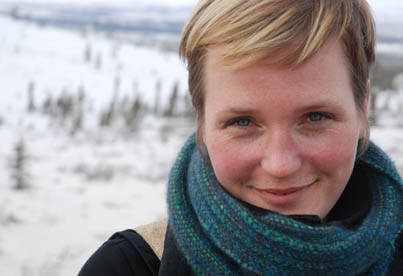Notes from the field: Homeless in my homeland
Notes from the field: Homeless in my homeland McGill University
User Tools (skip):
NOTES FROM THE FIELD
Homeless in a homeland

Julia Christensen on a snowy drive down the Dempster Highway just outside Inuvik.
Corey Kereliuk
I was born and raised in Yellowknife, capital of the Northwest Territories. In the last 10 years, the number of people without a stable place to live in my home community has grown. Yet, statistics from the few shelters in the territory, combined with data on core housing need, demonstrate that the experience of both visible and "hidden" forms of homelessness is shared by a significant number of northern people. One of the main objectives behind my doctoral research is to find out why. To do so in as comprehensive a way as possible, I've chosen to focus my study on three communities, from large to small: Yellowknife, Inuvik, and Paulatuk.
Since March, I have conducted fieldwork in Inuvik, a small town of about 3,500 people on the Mackenzie Delta, just 100 kilometres from where the Mackenzie River opens up into the Beaufort Sea. It is a young community - 50 years old this year - and a meeting place for Gwich'in and Inuvialuit, both indigenous to the region, as well as relative newcomers from other parts of Canada and the world. Inuvik is a pretty community: colourfully painted row houses; scrappy spruce trees sprouting up from the muskeg; and ravens, the biggest you have ever seen, squawking from atop telephone poles and teasing yard dogs by stealing their food.
I have been fortunate enough to hire a field assistant, a local high school student named Kate. Together, we conduct focus groups and in-depth interviews with people living homeless in the community, as well as others who provide services and advocacy to the homeless or work in relevant areas of government policy-making and program development.
This morning, we are conducting a focus group with 12 homeless men living in the community. Kate and I introduce ourselves and go over the project, its objectives and the nature of the topics we will discuss.
Before beginning my fieldwork here, I was nervous. Without a stable place to live, people tend to feel very vulnerable. I was worried the discussions would rustle up memories of hardship and pain among participants and, combined with a lack of familiarity with me, hinder their openness. In fact, I have found quite the opposite. Most people have been extremely open and enthusiastic, eager to share their firsthand experiences and offer insight into the root causes of housing insecurity in the North and how it relates to homelessness.
This morning, the focus group participants are curious as to why I am here; they have never had a researcher come to speak to them before. What will happen to this research, they ask? I explain that it will form the basis of a series of community feedback workshops, and that everything will eventually make its way into a thesis as well as a community report to be distributed to relevant decision-making and funding bodies, such as the various levels of government.
"You mean, what we say will make it into your report?" one man asks. Yes, I say, your knowledge and experiences are central to this research.
"Will important people read this?" asks another. While I can't guarantee they will read it, I say, I will definitely make sure that key northern decision makers receive a copy of the work. All of a sudden, I am met with an outpouring of ideas for who should receive a copy of the work: "the Minister of Housing," "the Premier," "the Inuvialuit Regional Corporation!"
As I quickly jot down their suggestions, I am struck by how different their reactions are to what I had expected. In reality, the very people I thought would be wary of me were excited at meeting someone who was interested in what they had to say.
Moreover, what they have to say is important - important to me, important to the research, even important enough to make its way to the desks of "important people." While I was passionate about the subject before beginning fieldwork, reactions such as these have made me even more aware of my responsibility as a social researcher. As research participants trust me with their experiences and perspectives, I am given the responsibility of making sure their stories are passed on to the people they feel distanced from. Walking home from the focus group, I acknowledge this responsibility once again. It does not weigh me down, but rather it reminds me of what inspired me to pursue a career in social research in the first place.
Julia Christensen is a PhD candidate in geography under the supervision of Dr George Wenzel. It was announced this week that Julia has been named a 2008 Trudeau Scholar and the recipient of a SSHRC Canada Graduate Scholarship. Julia's doctoral research on homelessness and housing insecurity in the Northwest Territories is funded through the International Polar Year project "The Impacts of Oil and Gas on Peoples in the Arctic Using a Multiple Securities Perspective."

